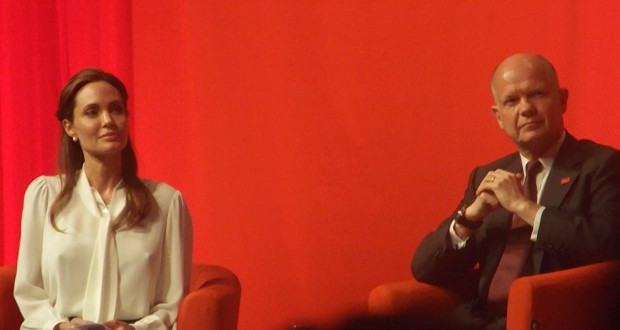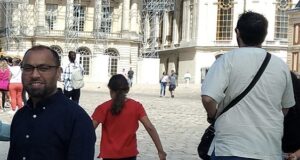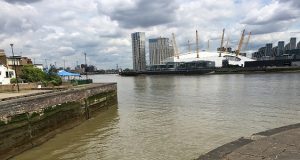From 10-13th June, London hosted the first international summit of its kind on the question of preventing rape and sexual abuse in countries a war. Was this a serious effort to prompt political change, or a cynical fig leaf for the Government to hide behind? Hanan Abdel-Khalek went along to find out.
The summit was attended by UN delegates from over 140 countries, prime ministers and Hollywood movie stars. They were all there in anticipation of being able to work out what can now be done to protect women and children from being the victims of these crimes in war torn countries.
Among the flurry of cameras and members of the public swarming around Brad and Angelina – almost stopping them in their tracks at one point due to overcrowding, causing people to fall on top of one another – the common theme throughout the four day summit was delegates expressing their yearning to discuss what was to be done next.
Organisations gathered on the Summit Fringe included War Child, Plan A, Congo Calling and many other charities working closely with people on the ground in Bosnia, Kenya, Ghana and the Democratic Republic of the Congo. They explained how they are actively working to stabilise and ensure women’s rights are being heard and catered for.
To rape women and children is to dehumanise them, it is to make them feel violated and ashamed to return to their husbands. Destabilising the country is high on the agenda for insurgent groups who abuse women and children, to make it weak so they can gain control. These places need equilibrium to be restored so that the existing social order can continue.
Spoken word poets and activists from Congolanese Action Youth UK highlighted the importance of remaining positive and dedicated to enlighten and inspire youth in London to take action once they knew of the crimes taking place in other countries which may or may not represent their own ethnic heritage. A member of the crew told us that by watching documentaries she could relight the passion she had to fight for justice. Many workers dedicate time aside from their day jobs in education to work on inspiring the youth of London to take action with a long term aim of protecting women in war torn countries.
Hearing victims speak out, giving first hand accounts of what had happened to them, gave the summit a sickly, morbid appeal to the conference. As the days went on, those present were able to gain direct insight into the horrors of crimes inflicted by and under the conditions of war – and the monumental psychological and physical effects that have taken their toll on female victims.
One woman spoke of being attacked in Minova in the Democratic Republic of Congo: “The man said that he wanted to rape me, that if I refused he is going to kill me. Then another five men came. They all raped me. My daughter keeps asking me about her dad. When I try to reveal who her father is, it is really hard for me.”
Photojournalists from the New York Times had recorded captivating images of women and children in Ghana who had been exposed to hateful and mindless acts of rape and abuse in order to bring shame to women. The attacks were aimed at making them voiceless, at making them want to give up and disappear. Many of these stories were enough to bring Angelina Jolie to tears. She was seen clutching activist and peacemaker Neema Namadamu on one occasion, after victims had shared their stories.
Do we go with our heads or our hearts? Cold logic and emotion were both on display. Sminars were held for ministers and UN delegates to draw solutions about what is to be done next – metres away from where activists were showing independent films and documentaries. Angelina Jolie’s 2011 film In the Land of Blood and Honey, which was played twice in the four days, is designed to educate and enlighten members of the public on issues that are not made prominent enough by the mainstream media. Other, less famous artists had a similar approach.
A media frenzy surrounded UN delegates on both floors during conference sessions discussing the role faith leaders and communities can play in tackling sexual violence in conflict, women’s participation and international action to address accountability.
Human rights lawyer (and George Clooney’s new fiancée) Amal Alamuddin was spotted among the crowd for a short while on day three of the Summit. Bianca Jagger gushed that a summit of this scale “was admirable and commendable”, as she expressed how she was “very, very upset and distressed to see that victims of sexual violence and torture in Sri Lanka were not featured”. Her concern was expressed after the press conference held on the last day, which made it clear that the Summit was positioned to raise issues of rape and violence in some countries but not others. However, this was a topic that could not be avoided. One member of the public asked a rhetorical question of spoken word poetry performers from the Congo. While everyone was discussing the history of the Congo she asked, “Why is no one addressing the elephant in the room? The British Government cannot deny its involvement in contributing to the chaos in some of the war torn countries mentioned today.” They are now working to help eradicate such acts of sexual violence as a weapon of war in some of these very same countries.
Volunteer Kevin Ovita Teddy is a member of Wasaani Mataani, a group of artists based in Kangemi who mainly do emceeing graffiti, building, deejaying, break dancing and free styling. It includes artists, actors and lyricists, hop contortionists, poppers, breakers and hip hop dancer performing artists and a theatre troupe – and its members wish to bring about social change in their existing society.
Kevin Ovita Teddy shared his general outlook on the summit. When he was asked about some countries not being given enough exposure for the crimes allowed to take place within their borders, he said, ”Utopian thinking is the motor force of society.” He went on to explain it highlights the importance of remaining motivated regardless of how much coverage the media decided to give each cause.
Spoken word poets and activists working to educate the masses and advocate change in the Congo stated how the main focus is on positivity and gaining the world’s attention through media and high profile figures such as Angelina Jolie. They went on to imply there was no denying how much it reeked of double standards on the part of the British Government.
By default a young woman who wished to remain anonymous for the safety of her family in Ogaden wasn’t at the summit with any major organisation. She spoke to me about her personal experiences of escaping rape in prison which she described as “a sign from God”. She thought that God had been watching over her as the moment a guard was removing his clothes with the intention of raping, her a fight broke out outside which interrupted what could have been a horrific reality.
Many of her friends and family were not so lucky. Girls as young as nine were taken to prisons and raped repeatedly. Shocking acts of sexual violence against women in Ogaden, a region in Ethiopia, continue to be used as a weapon of war, as research carried out by Ogaden Woman’s Relief Association conveys. This story, however, didn’t receive much attention within the London Summit – the reason being that acts alike these are being carried out by the Ethiopian Government, one of the most important allies of the UK in the Horn of Africa. The elephant in the room arises once more as we question the motives behind pushing particular victims’ stories to the forefront with absolute no coverage for others. Surely suffering doesn’t deserves to be ranked on a scale of importance?
Highly reputable human rights lawyer David Hammond of 9 Bedford Row represented the first Libyan woman to speak out about her personal experience of being a victim of sexual violence in war. When asked about the allegations of sexual abuse of female immigrants held in Yarls Wood Immigration Removal Centre in the UK, he refused to comment saying he was not “qualified enough to speak about this topic”.
Medica Zenica (MZ) is the oldest non-governmental organisation dealing with victims of rape in war and has seen 22 years of suffering since it first occurred in the Balkans. The organisation provides education for professionals working with survivors of rape, lobbying and advocating for improvements of the life quality of survivors as well as establishing networks that provide opportunities for survivors of war rape. This provides more than 400,000 services across Bosnia and Herzegovina.
The founder was affected by the war personally, and having to live with the effects on members of her family, she set up the organisation 22 years ago and it has been going strong ever since. She told me of the great number of changes she had seen in first and second generation victims. She set up Medica Zenica in order to work on the psychological stability and wellbeing of victims of sexual violence in war and to help build up their self- esteem. She wanted to help their children find stability in their lives: they were looking for answers about their past and their origins and were seeking an understanding about their history and the trauma they had experienced in the years after the violent conflict had been buried.
What became increasingly apparent during the summit was how little charity workers and victims on the ground were given a voice. For example, the MZ founder and CEO claimed she heavily disliked some of the scenes and representations of the war in Bosnia recreated by Angelina Jolie in the Land of Blood and Honey.
After Ban Ki Moon’s lengthy open to the conference on the final day, US Secretary of State John Kerry rounded up the conference in a lengthy speech “Make no mistake: we can end this, establish new norms, hold those who commit those acts accountable and no longer tolerate these horrific tactics.” He went on to state as a “war veteran and father of two daughters”, the issue was a “personal matter”.
Many could agree it was massive step in the right direction in gaining close attention from the world’s media. It was important to see a number of high profile figures, UN delegates and Hollywood A- listers promoting the idea that pressure must now be put on world leaders, governments and members of the UN.
Lieutenant General David Morrison. Chief of the Australian Army, gave a powerful speech suggesting better education for members of the armed services and the presence of more women in the military – and was seen as a beacon of hope for change. The need to set up reliable, efficient and consistent laws and solutions which ensure the safety of victims and their psychological wellbeing is an imperative. It is vital to build up societies which have been broken down and made weak and unmanageable through the weapons of war and political agendas.
Large holes could be picked in how visible it was that certain countries came to the forefront of concern more than others, both on the part of world leaders and sections of the media. However, to experience any kind of active movement for change at all, in London hosting a summit of this scale for the first time, was an achievement. It seems William Hague and Angelina Jolie are a step further forward in finding success, after two years of deliberating and pushing for the summit to go through. A change is coming, and people are becoming mobilised regardless of political agenda.
 East London News A Force for the community…
East London News A Force for the community…




